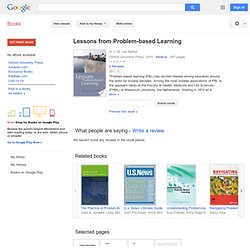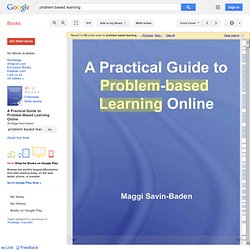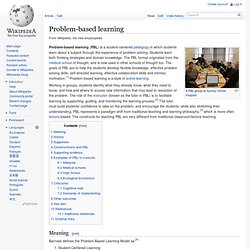

Lessons from Problem-Based Learning - Henk Van Berkel, Albert Scherpbier, Harry Hillen, Cees Van Der Vleuten. Henk van Berkel's research interests are educational testing and problem-based learning.

From 1969 till 1976 he studied psychology at the University of Amsterdam. He received his PhD in 1984 at the same university. He published eleven books, mainly on topics as the Quality of Education and Educational Assessment. In addition, he wrote over 150 articles, including chapters in books and contributions to newspapers. He is the founding father of two journals, Advances in Health Sciences Education (publisher: Springer) and a journal in Dutch: EXAMENS. Albert Scherpbier is a graduate of the University of Groningen, the Netherlands, where he was surgical education coordinator from 1980 until 1991. Prof.dr.H.F.P. Cees van der Vleuten came to the University of Maastricht in 1982. Didactica psichologiei symposium PBL 2003proceedings. A Practical Guide to Problem-based Learning Online - Maggi Savin-Baden. Books.google.co.za - Providing an overview of the current state of problem based learning online, this book examines why we're moving from face-to-face to online provision, considers existing forms of provision, outlines common mistakes and strategies to avoid future problems, and shows how to effectively facilitate l...

Practical Guide to Problem-Based Learning Online Page i A. Practical. Guide. to. Page vii List ofillustrations Acknowledgements Abbreviations 1 PART1 Deciding how to implement problem-based learning online 5 1 Reasons for implementing problem-based learning online 7 2 Forms of problem-based learning online 3 Common ... Page ix Figures 1.1 Problem-based curricula model 1.2 A 12-week module/unit designed using problem-based learning 5.1 Learning space in Second Life 7.1 The location of the game on the Coventry University Island 7.2 The learning space for ...
Page xii Page 1 Page 2 Page 3 Maggi Savin-Baden. the notion of content coverage. Page 4 Page 5 Page 7 Page 8 Page 9 Page 10. One-Day, One-Problem: An Approach to Problem-based Learning. How to Use Problem-Based Learning in the Classroom - Robert Delisle. Problem-Based Learning the 4 Core Areas (PBL4C) in Mathematics Education. New Education - Timeline Tools - New Education. Technology And Problem-Based Learning - Lorna Uden, Chris Beaumont. Problem-based learning. Problem-based learning (PBL) is a student-centered pedagogy in which students learn about a subject through the experience of problem solving.

Students learn both thinking strategies and domain knowledge. The PBL format originated from the medical school of thought, and is now used in other schools of thought too. The goals of PBL are to help the students develop flexible knowledge, effective problem solving skills, self-directed learning, effective collaboration skills and intrinsic motivation.[1] Problem-based learning is a style of active learning.
Working in groups, students identify what they already know, what they need to know, and how and where to access new information that may lead to resolution of the problem. Meaning[edit] Barrows defines the Problem-Based Learning Model as:[4] 1. 2. 3. 4. 5. 6. In order to instill a project based learning environment into a classroom, the teacher must revolve his or her teaching style around five main criteria.